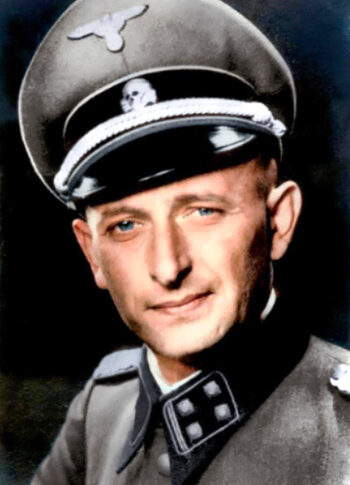Eichmann, Adolf

Adolf Eichmann (19 March 1906 – 1 June 1962), SS Obersturmbannführer, was head of Sub-Department IV D4 of the Reichssicherheitshauptamt (wartime Germany’s Department of Homeland Security) from 19 December 1939, charged with overseeing Jewish affairs and evacuation/deportation of the Jews. As such, he was responsible for the deportation of several million Jews to the various German labor, concentration and transit camps, as well as their evacuation to Polish ghettos and the eastern occupied Soviet territories. He was also involved in planning the deportation of Europe’s Jews to Madagascar, a plan shelved in early 1942.
After the war, Eichmann went into hiding in Argentina and was eventually assumed either missing or dead. Therefore, during the Allied postwar tribunals, there was a tendency among German officials to use Eichmann as a scapegoat, blaming him not only for the deportation of the Jews, but falsely portraying him also as responsible for organizing their alleged wholesale slaughter. Two former German officials quoted Eichmann as having told them that the Jewish death toll was five or six million, respectively (Dieter Wisliceny and Wilhelm Höttl), although Eichmann later denied this. Furthermore, he would not have been in a position to know what happened to all the Jews whose deportation he organized, let alone to those millions he had nothing to do with. In fact, during his own trial, he stated that he himself “was kept in the dark as well as to how many or who would be killed.” (See Heddesheimer 2017, p. 9; Rudolf 2023, pp. 400f.)
Eichmann’s undoing was that, in Argentina, he started bragging about his wartime role, dramatizing his own involvement in the persecution of the Jews in interviews he gave to the Dutch journalist Willem Sassen, weaving into his narrative things he had read and heard about in the media, mixing his own memories with fact and fiction, with rumors and lies bandied about in the world’s mass media. This led to his capture in Argentina by an Israeli Mossad team in May 1960, who transported him to Israel. The subsequent trial against him in 1961 was the role model of all later Holocaust show trials. The proceedings were broadcasted on Israeli TV, and many witnesses testified about the most horrific claimed events of the Holocaust, even though Eichmann, from his offices in Vienna and Berlin, had nothing to do with them. The quality of these witness accounts was similar to those later made during the Jerusalem trial against John Demjanjuk, with the difference that the Israelis did not allow any effective defense to be organized for Eichmann – or rather, Eichmann’s lawyers decided not to challenge any of the dogmas surrounding the mainstream Holocaust narrative, trying only to minimize Eichmann’s responsibilities in it (Rudolf 2024a, p. 128f.).
Although Eichmann confirmed many of the orthodoxy’s claims about the Holocaust during his trial, the following facts need to be considered:
- The Wannsee Memorial Museum has compiled a document containing various, at times contradictory, statements that Eichmann made during his trial. This compilation inevitably gives the impression that Eichmann was confused.
- When asked about exterminations at Auschwitz, Eichmann qualified his memories about them (Rudolf 2024a, p. 129):
“I do not know whether I am only imagining that today, but I do not believe I am imagining it. I cannot recall exactly when and how he told me that and the location where he told me. Perhaps I read it and perhaps I am now imagining what I had read I heard from him. That is also possible.”
Eichmann had not only read a lot of literature on the topic before his capture, but was provided with even more material during his incarceration by his Israeli captors. Hence, his memories were inevitably altered by what he had read after the war.
- He made a number of nonsensical claims about alleged events: he insisted that the Germans had developed portable gas-chamber sheds that could be rapidly set up if, for instance, some Jews were found hiding somewhere in the woods (Rudolf 2024a, p. 123).
- He seriously claimed that diesel engines taken from Soviet submarines were used in central Poland to gas Jews, never mind that diesel-engine exhaust gases are unsuited for mass murder, or that it is nearly impossible to take a submarine engine out of a captured Soviet submarine, transport it across Poland, and set it up and make it work in some remote camp (ibid., p. 433, FN 57).
- Eichmann also repeated the cliché of mass graves expelling geysers of blood, a physical impossibility (ibid., p. 122).
A full critical analysis of the 1961 Eichmann Show Trial is still pending, exposing its background and conduct rooted in fanaticism and mass hysteria. This trial defined the Holocaust as the most-important event for Jewish and Israeli identity, and the trial catapulted it into the center of worldwide public awareness, where it has continually grown in importance.
(See also Winter 2023, pp. 483-503.)

You need to be a registered user, logged into your account, and your comment must comply with our Acceptable Use Policy, for your comment to get published. (Click here to log in or register.)